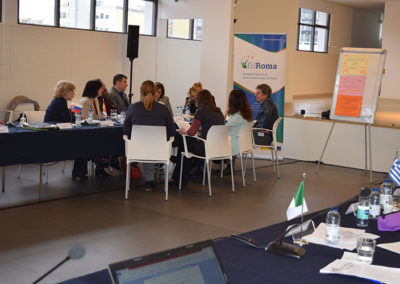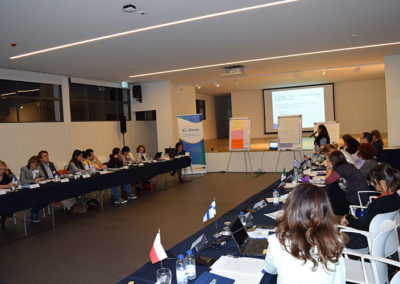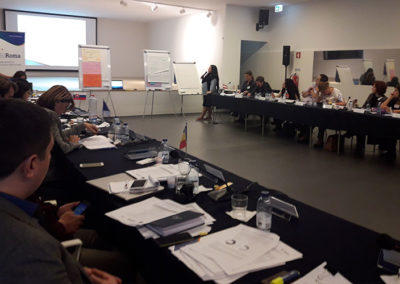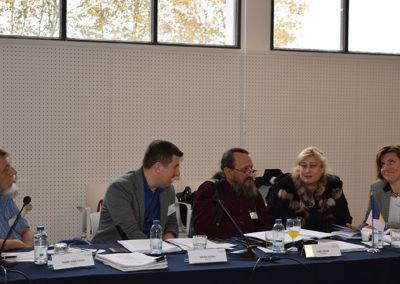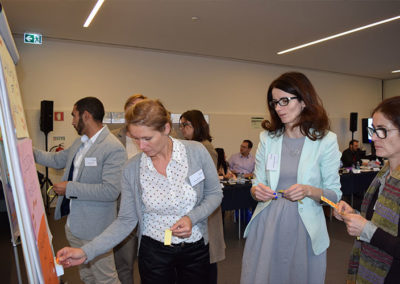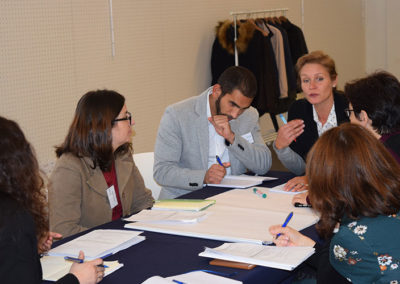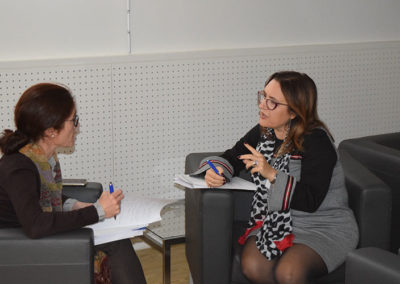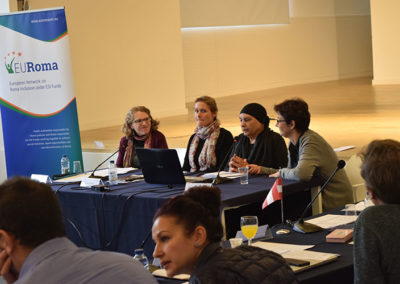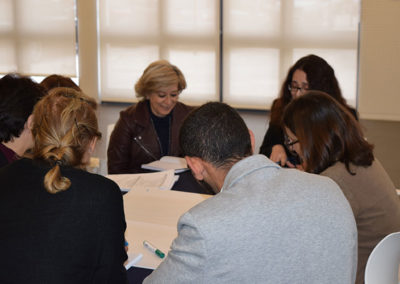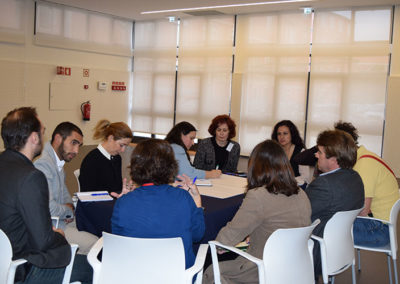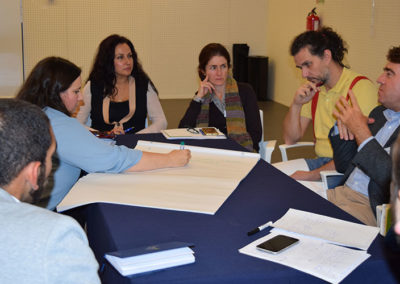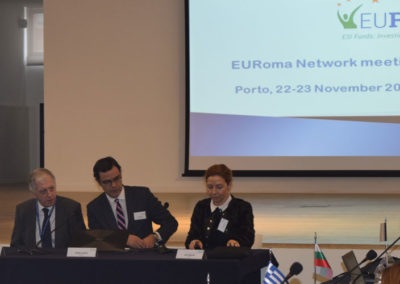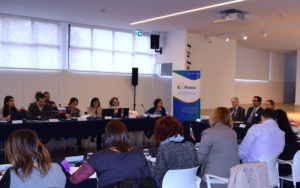 On 22-23 November 2017, the EURoma Network organised its second meeting of the 2014-2020 programming period in Porto (Portugal), hosted by the Portuguese Network partners. The meeting gathered Network partners – i.e. bodies managing ESI Funds (Managing Authorities/Intermediate Bodies/other management bodies) and those in charge of Roma policies (National Roma Contact Points)- of eleven EU countries, in addition to the European Commission and the Network Technical Secretariat (Fundación Secretariado Gitano).
On 22-23 November 2017, the EURoma Network organised its second meeting of the 2014-2020 programming period in Porto (Portugal), hosted by the Portuguese Network partners. The meeting gathered Network partners – i.e. bodies managing ESI Funds (Managing Authorities/Intermediate Bodies/other management bodies) and those in charge of Roma policies (National Roma Contact Points)- of eleven EU countries, in addition to the European Commission and the Network Technical Secretariat (Fundación Secretariado Gitano). With a view to contributing to the improvement of the implementation of European Structural and Investment Funds (ESI Funds) to promote the social inclusion, equal opportunities and non-discrimination of the Roma population, the meeting aimed to:
- Review relevant EU developments as regards ESI Funds and Roma inclusion in order to better understand and be up-to-date on the general EU Framework for action.
- Look at two of the aspects identified as key for the implementation of ESI Funds for Roma inclusion, notably:
- The coordination mechanisms between the bodies managing ESI Funds and the bodies responsible for Roma policies at different levels (national, regional and local)
- The targeting of Roma inclusion under ESI Funds in practice, both under European Social Fund (ESF) Investment Priority 9.2. (socio-economic integration of marginalised communities such as the Roma) and other investment priorities and thematic objectives.
- Discuss the ongoing and upcoming Network activities and products.
- Learn about the Portuguese context regarding the situation of Roma and how the main policies and ESI Funds address Roma social inclusion as well as hear about some ESI Funds-funded initiatives with a view to identifying relevant elements for successful investments.
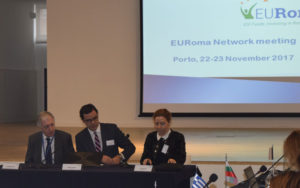 Welcome and opening remarks
Welcome and opening remarks
In his capacity of Director, Mr. António Tavares welcomed participants to the Santa Casa de Misericórdia do Porto, an organisation dedicated to social solidarity, where the meeting was hosted. Mrs. Ana Sampaio, of the Executive Committee of the Management Authority of the Portuguese Employment and Social Inclusion Operational Programme (POISE) (the programme that includes the most relevant actions related to Roma inclusion), and Mr. Pedro Calado, High Commissioner for Migration (Portuguese National Roma Contact Point), were in charge of opening the meeting on behalf of the Portuguese Network partners.
They shared with participants some initial ideas on the role of their respective organisations as well as on the Portuguese context as regards the situation of Roma population and the initiatives aimed at Roma inclusion. More detailed information on the Portuguese context was provided the day after as part of the ‘Portuguese country monograph’. As Mr. Calado pointed out, although much progress has been made since the Portuguese National Roma Integration Strategy (NRIS) was launched in 2013, it is necessary to fast track integration in order to make sure that no more generations are lost. To this end, ESF future programming has to be fostered in Portugal with a view to moving faster together.
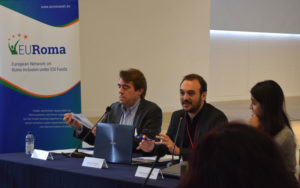
Setting the context for action: What is happening in the EU Framework as regards Roma inclusion and ESI Funds?
As in previous meetings, a session was devoted to reviewing relevant EU developments as regards ESI Funds and Roma inclusion with a view to better understanding and be up-to-date on the general EU framework for action and looking for possible synergies and complementarities between the work of the Network and the EU agenda.
European Commission (Directorate-General (DG) Employment, Social Affairs and Inclusion) representatives Mr. Dominique Bé, dealing with the policy side of Roma inclusion, and Ms. Jessica Vilela Hansraj, of the Portuguese Geographical Desk, and the EURoma Technical Secretariat were in charge of providing participants with information about initiatives carried out by DG Employment and DG Justice as well as by the European Parliament, notably:
- The state-of-play and main challenges of the implementation of ESI Funds for Roma inclusion in the 2014-2020 programming period, focusing mainly on the European Social Fund (ESF) and the Youth Employment Initiative (YEI), which is considered an opportunity not only because many Roma belong to the target group of this fund (those ‘Not in Education, Employment, or Training’, NEETs) but because of the recent increase of funds for Member States with a youth unemployment rate higher than 25%.
- The current proposals for the post-2020 EU Framework for Cohesion policy and the 7th Report on Economic Social and Territorial Cohesion, released by the European Commission in October 2017, which will feed into these discussions.
- The ongoing process of reflection on the post-2020 EU Framework for Roma policies, including the European Commission Communication on the mid-term review of the National Roma Integration Strategies (NRIS) (adopted in August 2017), the ongoing evaluation of the EU Framework for NRIS and the next steps.
- The European Pillar of Social Rights, adopted in April and solemnly proclaimed on 17 November, which seeks to deliver new and more effective rights for citizens in relation to three categories: equal opportunities and access to the labour market, fair working conditions and social protection and inclusion.
- The European Parliament Report on Protecting the Fundamental Rights of Roma People in the EU.
In addition, the main outcomes of a number of specific initiatives gathering the views and experiences of actors trying to use EU Funds or involve Roma people at local level were presented.
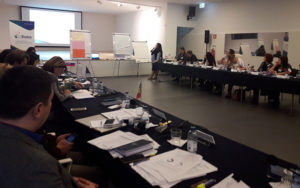
Looking at key aspects of the implementation of ESI Funds for Roma inclusion
Following the review of the context for action, participants focused on the implementation phase, in particular on two of the aspects identified as key for the implementation of the ESI Funds for Roma inclusion:
- The mechanisms of coordination between the bodies managing ESI Funds and the bodies responsible for Roma policies at different levels (national, regional and local), a crucial element for a better alignment between policies and funds. The existing practices in terms of coordination were reviewed with a view to identifying elements of success and areas for improvement.
- How Roma inclusion is targeted under ESI Funds in practice (whether under the specific investment priority 9.2. or other IPs and TOs). Key elements contributing to achieve an effective targeting of Roma and elements to be improved were jointly identified and discussed.
Through the use of interactive methodologies, participants had the opportunity to share knowledge and experiences on these topics based on their respective national contexts.
Ongoing EURoma Network activities and products
EURoma Technical Secretariat shared with participants a number of activities that are being developed building upon the work plan discussed and agreed at the first EURoma meeting, including:
- The renewed image and logo of the Network. This change will apply to the new website of the Network, aimed to be a reference source of information on the work of the Network as well as on the use of ESI Funds for Roma inclusion.
- A proposal for the first thematic activity of the Network, which will focus on the area of housing, following the interest raised by partners. This initiative, planned for the first quarter of 2018, will gather Network partners as well as other relevant stakeholders as regards the use of ESI Funds to improve housing conditions.
- A proposal for EURoma contribution to the assessment of the mid-term review of the EU Framework for National Roma Integration Strategies up to 2020, building upon the discussions in previous meetings.
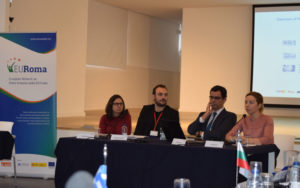
Looking at the Portuguese context
The second day of the meeting was devoted to analyse the Portuguese context as regards policies and ESI Funds aimed at promoting social inclusion, equal opportunities and non-discrimination of the Roma population building upon the presentations made by Portuguese Network partners.
Mr. Pedro Calado (High Commissioner for Migration and National Roma Contact Point) set the context by presenting the situation of Roma population in Portugal. Mrs. Marisa Horta (of the Roma Communities Support Unit of the High Commission for Migration/NRCP) and Mrs. Ana Sampaio (of the ESF Social Inclusion and Employment Operational Programme, POISE) then shared information with participants on the implementation of the Portuguese NRIS and the POISE, which includes the main actions aimed at Roma social inclusion.
Following the presentation of the general context, a number of initiatives, funded by ESI Funds and by other funding sources, were presented. These presentations were aimed to contribute to the exchange of experiences among partners and to identify elements of relevance for interventions aimed at Roma inclusion to be successful.
Initiatives shared were as follows:
- Project of municipal mediators (funded under the ESF 2007-2013 Human Potential OP) and programme of intercultural mediation (funded under the 2014-2020 ESF Social Inclusion and Employment OP).
- Choices Programme (funded under the 2014-2020 POISE, Regional Lisboa OP, Regional Algarve OP), aimed at the promotion of social inclusion of children and youth.
- National Strategy Support Fund (funded with state budget), launched in 2015 in order to foster the implementation of the NRIS by providing financial support to experimental and innovative projects aimed to combat discrimination of Roma communities in Portugal.
- Programme for the Promotion of Education (OPRE Programme), a public programme, managed by Choices Programme, in partnership with Letras Nómadas Association and REDE Association, aiming to mitigate the barriers between the Roma communities and the formal educational system. This programme has become a public policy.

